Don't wanna be here? Send us removal request.
Text
rainy day vocab (mandarin)

this was inspired by a post i saw by @talen-en-regendagen
雨 yû rain
大雨 dàyû heavy rain
雨天 yûtiān rainy day
雨季 yûjì rainy season
水 shuî water
雨滴 yûdī raindrop
雨丝 yûsī drizzle
毛毛雨 máomáoyû drizzle
水坑 shuîkēng puddle
雾 wù fog, mist
雷 léi thunder
雷雨/雷暴 léiyû/léibào thunderstorm
闪电 shândiàn lightning
冰雹 bīngbáo hail stone
风 fēng wind
彩虹 câihóng rainbow
雨伞 yûsân umbrella (can also just say 伞)
雨衣 yûyī raincoat
雨靴 yûxuē rain boots
下雨 xiàyû to rain
下雹 xiàbáo to hail
大风 dàfēng windy
淋雨 línyû to get wet in the rain
满城风雨 mân chéng fēng yû lit. wind and rain through the town; fig. a big scandal, the talk of the town
雨后春笋 yû hòu chūn sûn lit. after rain the spring bamboo; fig. rapid new growth, many new things emerge in rapid succession
雨过天晴 yû guò tiān qíng lit. sky clears after rain; new hopes after a disastrous period, every cloud has a silver lining (also written 雨过天青 with 青 qīng)
梨花带雨 lí huā dài yû lit. like raindrops on a pear blossom; fig. the tearstained face of a beauty
as usual if there are any mistakes just let me know!
2K notes
·
View notes
Text
Beautiful Chinese words
光 guāng - light, ray
阳光 yángguāng - sunshine
光明 guāngmíng - radiance
晨光 chénguāng - early morning light
彩霞 cǎixiá - rosy clouds at sunrise or sunset
櫻花 (樱花) yīnghuā - cherry blossom
星座 xīngzuò - constellation
露水 lùshuǐ - dew; fig. ephemeral
暮靄 (暮霭) mù'ǎi - evening mist
花蕾 huālěi - flower bud
白日夢 (白日梦) báirìmèng - daydream
雪花 xuěhuā - snowflake
蜂蜜 fēngmì - honey
雨傘 (雨伞) yǔsǎn -umbrella
明星 míngxīng - star
棉花糖 miánhuatáng - cotton candy
花火 huāhuǒ - firework
香味 xiāngwèi - fragrance
落花 luòhuā fallen petals
紛飛 (纷飞) fēnfēi - to flutter around (of snowflakes, flower petals)

2K notes
·
View notes
Photo

我对你______
爱应该______
学习应该_______
工作应该_______
39 notes
·
View notes
Note
Hey there :-) I don't know for sure if it was you, but I think so (I don't follow a lot of people). Did you (re-)post a post a couple of weeks ago about the costumes in "The Rise of the Phoenixes" where OP explains which dynasties the clothes come from? I'm searching everywhere but I can't find it anymore. Best wishes and happy new year!
i’m pretty sure i reblogged one…..
is this is?
2 notes
·
View notes
Note
Are you watching The Rise of the Phoenixes on Netflix? If so what’s your fav outfit so far?
Hi, thanks for the question!
I’m going to combine this question with another one I received that mysteriously disappeared (tumblr must’ve eaten it…), which asked to identify the clothing in “The Rise of Pheonixes”. Disclaimer that I haven’t watched the actual show, so everything here is going to be based off of photos.
Similar to “The Empress of China”, the costumes in “The Rise of Phoenixes” are mostly based on Tang dynasty hanfu, with some creative liberties taken by the designers. Female lead Feng Zhiwei’s most commonly worn female outfit is the chest-high ruqun, an outfit consisting of a top (ru) and skirt (qun), in which the skirt is tied above the breasts or at the bust point. It’s often accessorized with a large-sleeve outer robe called daxiushan.
Feng Zhiwei seems to be fond of wearing sheer ru & matching qun and daxiushan cut from the same cloth:
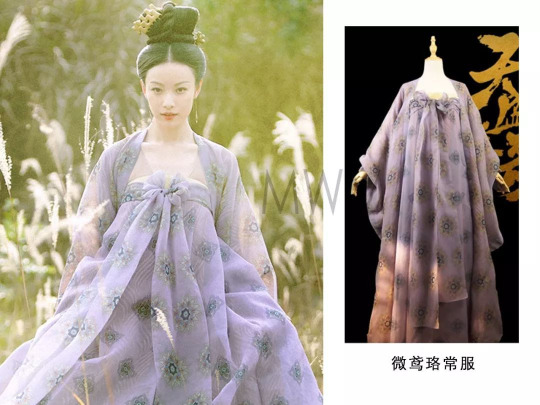
Sometimes she’ll wear a short outer skirt called weichang over the qun (in the outfit below, the weichang and daxiushan are matching):
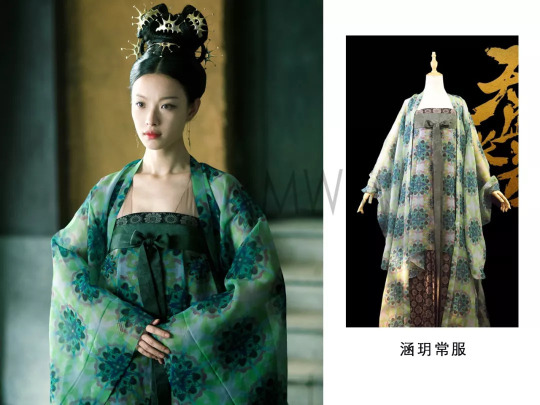
This outfit comprises a non-sheer purple ru & dark blue polka-dotted weichang, as well as a light purple beizi (jacket):
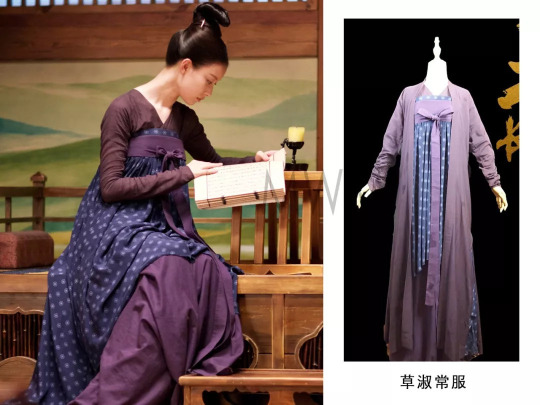
Ruqun is often accessorized with a long scarf called pibo, that’s worn wrapped around the arms & behind the back, as can be seen in the photo on the left:
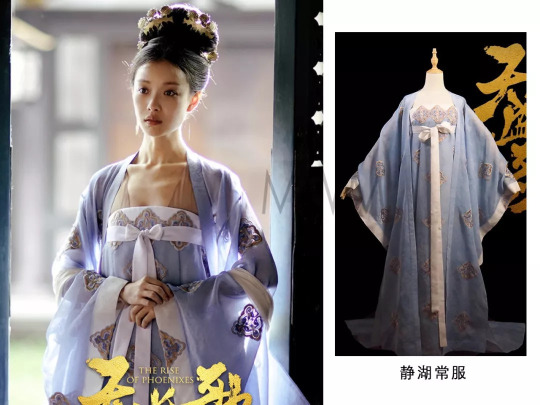
Another style of women’s hanfu on the show is heziqun, an outfit that consists of the hezi (strapless chest cover), skirt (qun), and top (ru). The hezi is worn over the top, and a thin cloth belt is typically used to hide the joint between the hezi and skirt. Heziqun is also accessorized with daxiushan and pibo:


Feng Zhiwei also wears parallel-collar waist-high ruqun:

…and what appears to be a zhiju (straight-hem robe):
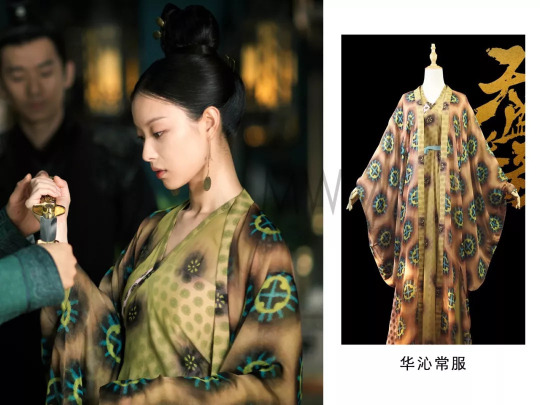
The male costumes worn on the show are mainly based on Tang, Song, and Ming dynasty fashions, and mostly comprise a variety of round-collar clothing based on the hanfu styles of yuanlingpao, yuanlingshan, and lanshan.Feng Zhiwei’s most common male outfit is the yuanlingpao (round-collar robe):


Here are some of the various round-collar outfits worn by the men on the show, including male lead Ning Yi:

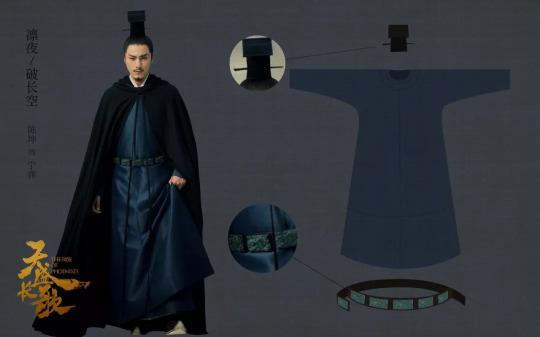
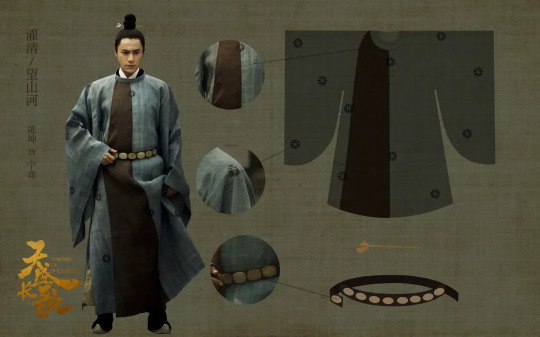
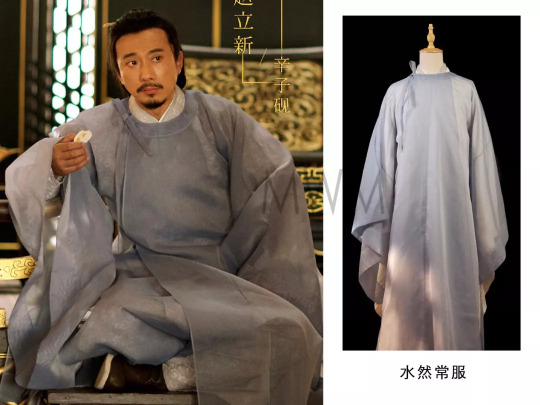
Here’s Ning Yi in mianfu, the ceremonial hanfu of the Emperor:
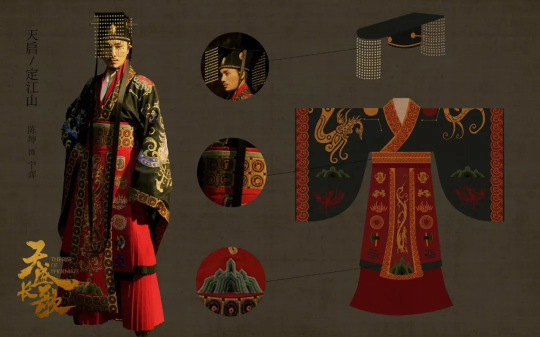
As for the question of what my favorite outfit is - personally, from looking at the photos, I find the male costumes more captivating than the female ones. Still, if I had to choose a favorite outfit worn by Feng Zhiwei, it’d be this ruqun below (the outfit also appears in this gifset). I love the sheer ru and the earthy color scheme:
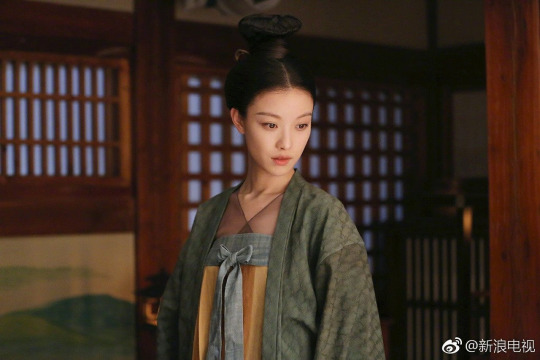
For favorite male outfits, I really like the dark brown yuanlingpao worn by Ning Yi in this shot. It goes really well with his long black hair and blue tuanshan (fan):

Finally, of course we can’t forget assassin/bodyguard Gu Nanyi’s Wuxia-inspired outfits - they make him look especially stunning!:
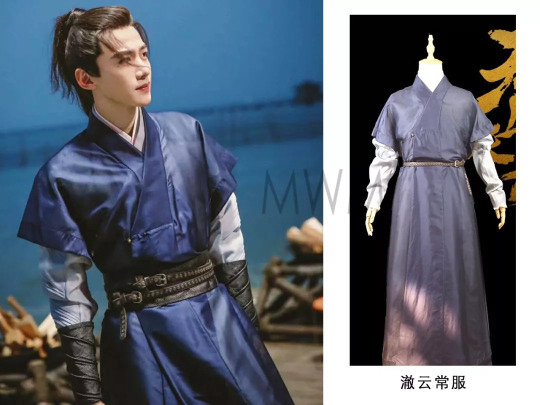
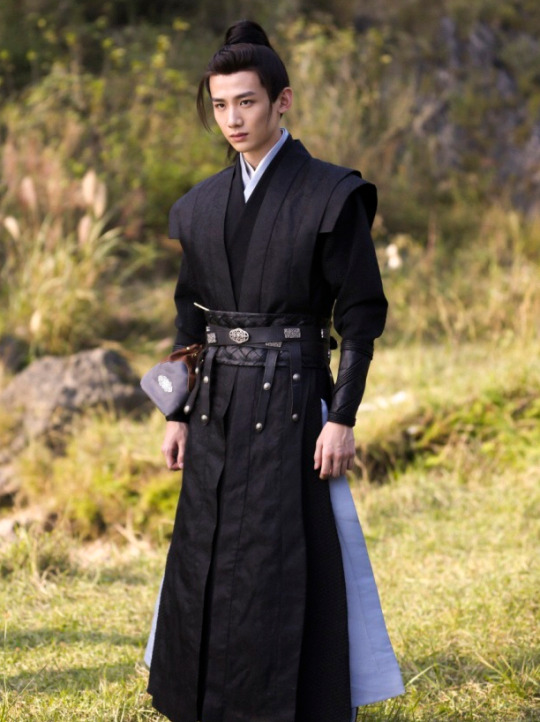
Hope this helps!
Photos via: 1, 2
1K notes
·
View notes
Quote
三人行,必有我师焉,择其善者而从之,其不善者而改之。
孔子
“out of three people walking together, there must be one who is my teacher. i’ll find out their merits so as to follow them and their demerits so as to avoid them.”
this famous quote from confucius talks about how we should learn from everyone. this phrase is often used to encourage people to learn from others or to express a modest attitude
(via liu-anhuaming)
98 notes
·
View notes
Photo






Linguistics takes on the “What’s something that seems obvious within your profession, but the general public seems to misunderstand?” quote-tweet meme.
33K notes
·
View notes
Text
I remember when I took a linguistics class in high school (like 3 years ago) and my teacher showed us this site that was super cool but I can’t remember its name. I don’t remember 100% how it was structured but it was something along the lines of you type a word in English and it shows you the word in other IE-languages. Or if it was words with the same root in other languages? (I think the latter one) Like you’d type “garden” and you would get a map of Europe and on Sweden it says like “gård” and on France “jardin” etc. as well as an English translation. I think it was something like that? Anyway, if anyone recognized this website please tell me what it’s called!
3K notes
·
View notes
Text
Mandarin: History and Politics Terms
中国特色社会主义 (zhōnguó tèsè shèhuì zhǔyì) - Socialism with Chinese characteristics
中国共产党 (zhōnguó gòngchǎndǎng) - the Communist Party of China (CPC) aka 中共 (zhōng gòng)
中华人民共和国 (zhōnghuá rénmín gònghéguó) - the People’s Republic of China
中国人民解放军 (zhōngguó rénmín jiěfàngjūn) - the People’s Liberation Army
最高领导人 (zuìgāo lǐngdǎo rén) - Paramount leader (currently Xi Jinping)
毛主席 (maó zhǔxí) - Chairman Mao
五四运动 (wǔsì yùndòng) - May 4th Movement
改革开放 (gǎigé kāifàng) - Reform and Opening
宣传 (xuānchuán) - propaganda, publicity
文化大革命 (wénhuà dàgémìng) - the Cultural Revolution (lit. the Great Cultural Revolution)
四人帮 (sìrénbāng) - the Gang of four
红卫兵 (hóng weìbīng) - the Red Guard
孔子 (kǒngzǐ) - Confucius
独生子女政策 (dúshēngzǐ nǚ zhèngcè) - the One-Child policy
一个中国政策 (yīgè zhōngguó zhèngcè) - the One-China policy
501 notes
·
View notes
Text
Common Poetic Idioms
Ekaterina Xia tweeted the other day about how common flowery language/purple prose is in Chinese essay writing compared to English, and how romantic idioms are just a widely understood part of how people write and speak, so I thought I’d share a couple of the examples she shared here:
梨花带雨 - Líhuā dài yǔ - (lit) like raindrops on a plum blossom; (fig) tear-stained face of a beauty

欲言又止 - Yù yán yòu zhǐ - make as to speak, but halting or stopping oneself

风花雪月 - Fēnghuāxuěyuè - (lit) wind, flowers, snow and the moon; refers to literary, romantic writing; effete language without substance; romance is in the air

122 notes
·
View notes
Note
I have recently started learning mandarin by myself since my school doesn’t offer any classes, I was wondering if you have any tips for studying or websites that I could use?
Hi there, sorry I took so long to answer this because this answer took me a really long time to compile 😂 First of all, great to know you are learning Chinese! Actually Mandarin is just a spoken form of Chinese, but I assume you are planning to learn how to read and write Chinese as well :D I’ve received quite a few questions about learning Chinese ever since I started this blog, so I thought I should write a detailed answer about this.
LONG ANSWER AHEAD
Before you start, do note there are actually two sets of (overlapping) Chinese characters out there,
1. Traditional Chinese characters (used in Taiwan and Hong Kong)
2. Simplified Chinese characters (used in Mainland China, Singapore and Malaysia).
I’m from Singapore so I learned simplified Chinese, I can generally read traditional Chinese as well though I have great difficulty writing them because I’m too used to simplified characters 😂😂 You don’t have to learn both, but it’s good to know the difference since you will probably encounter both types of characters at some point when you are studying Chinese/ consuming Chinese entertainment.
I definitely recommend learning Hanyu pinyin to help with the pronunciation of the words, but do note that pinyin is neither the Chinese alphabet nor meant to be a substitute for Chinese characters. There is no alphabet for Chinese… we do have Chinese radicals (further explained here) which is not really an alphabet but more like components of a character 🤔 For the most part, to learn Chinese characters you have to memorise them. Maybe you can set yourself a goal of memorising a few characters a day to kickstart the process, actually if possible I would recommend getting a Chinese copy book/app like this one:
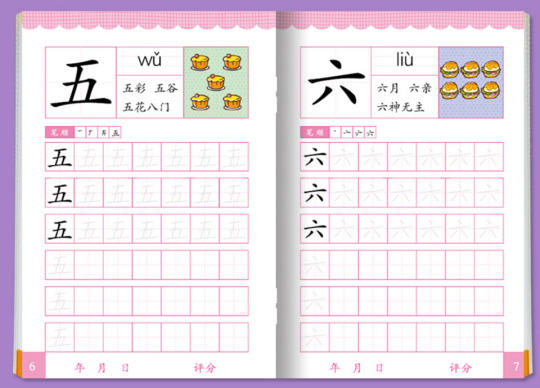
Writing the characters over and over is the best way to remember the words imo, also this will help you practise your handwriting!
A good dictionary is a must, for Chinese-English dictionaries the best one I have tried so far is the app Pleco. I used to have this book of 成语 (Chinese idioms) and 俗语 (Chinese sayings) as well that I had to memorise for school, but I think you can just learn them online (found some here) if you want :D You should probably wait till your Chinese reaches intermediate~advanced level before starting on those though, if not the whole thing might be kind of confusing.
For websites, I have never tried learning Chinese online before so I don’t have first-hand experience of any of the online Chinese learning sites, but I did find this list of online resources for learning Chinese which is really comprehensive. it covers sites and apps for everything from reading and writing Chinese characters to all types of podcasts. Actually you know what, there are more resources available online than I thought, there are even apps for you to connect to native Chinese speakers (I didn’t even know those existed until I wrote this answer) 👀 That list of sites and apps pretty much covers every aspect of learning Chinese so I don’t have much else to add tbh 😂😂 Just gonna recommend some entertainment options that will hopefully make your learning process more enjoyable!
(Below are mostly my personal song/ show/ manhua recommendations)
For songs there are really way too many so it’s kind of hard to draw up a list, maybe you can start with the songs of some of the more famous artistes like Jay Chou, A-mei, Eason Chan, Faye Wong, Mayday, Stefani Sun, Jam Hsiao… You can search for Mandopop playlists on Spotify for a start! I’m personally quite fond of 逃跑计划, Lala Hsu and 陈粒’s songs.
Also randomly recommending 夜空中最亮的星 and 平凡之路 because they are my favourite songs (夜空中最亮的星 almost made me cry the first time I heard it, even now after listening to it for so many times it still gives me the same feeling 👵🏻).
For dramas my favourite drama by far is Nirvana in Fire (琅琊榜), which imo is the best drama I’ve ever watched. My sister and I were obsessed with this show and recommended it to all our friends, it was so good!!

(side note I think Hu Ge’s face is especially suited for historical dramas)
Some other dramas I liked were Ode to Joy, The Fierce wife (Taiwanese) and The Legend of Zhen Huan, Nirvana in Fire Season 2 was also just released this year! My friend recommends Tens Miles of Peach Blossoms which she said made her cry a lot, and I think Yang Mi’s latest drama The Negotiator is quite popular too though I haven’t watched it yet. I actually don’t have a lot of dramas to recommend because I don’t really watch them 😂😂 But coming from someone who don’t particularly like watching dramas, Nirvana in Fire is really so freaking good…
Anyway besides songs and dramas, my other recommendations are 1) Web novels and 2) Manhua.
I highly recommend reading web novels (I mostly read on them on qidian), the Chinese web novel community is seriously gigantic and I’ve honestly only explored a very very very tiny fraction of their offerings because there are so many popular web novels out there. Btw even if you can’t read Chinese there are English sites (webnovel l wuxiaworld) where you can read the Chinese web novels translated into English for free, so you can enjoy them regardless of your Chinese abilities :D One well-known novel on both the English and Chinese site is The King’s Avatar (全职高手), which was made into a gorgeous Chinese anime last year

First episode here!
Btw if you download the qidian app they have this audio book function that I thought was pretty handy, you can listen to your favourite novels being read to you ->

(Click 听书 and it will lead to the audio)
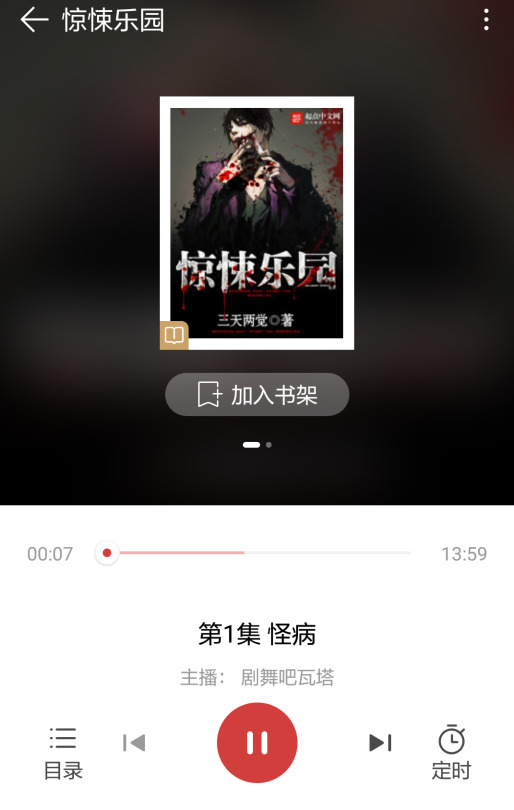
(One of my favourite novels 惊悚乐园/Thriller Paradise!)
For manhua I mostly read my manhua on kuaikanmanhua, 腾讯动漫 and occasionally dongmanmanhua. I made a short list of BL recommendations previously here, some other non-BL manhua I’m currently following are:
DOLO命运胶囊 (the art for this series is really beautiful)
女王的手术刀
哥哥是大笨蛋
看脸时代 (This one is Korean and really popular, it’s translated into English as well under the title Lookism but personally I prefer the Chinese translation)
A friend of mine recommended Duoluo Dalu (novel here) and Battle Through The Heavens (novel here) which I haven’t read yet, but if I’m not wrong both series are popular 👀
That’s all I can think of for now! Kind of off topic but from the perspective of an overseas Chinese I think Mainland Chinese entertainment have improved a lot in recent years. When I was young I could only remember a few shows from China like 还珠格格, Journey to the West, and Return of the Condor Heroes, and my own childhood was dominated by Japanese manga and Taiwanese Mandopop/ idol dramas (that’s how I learned to read traditional Chinese lol). But now there is an increasing number of quality productions from China, which is great for someone like me who is fond of Chinese entertainment (sadly Singapore’s Chinese entertainment scene is pretty lacking and Hong Kong and Taiwan’s entertainment industry have been declining, Singapore is currently pretty much dominated by Kpop and K-dramas). Hopefully Chinese entertainment will continue to get better and better in the near future ^^
In any case this list is non-exhaustive, but my answer is getting way too long so I’ll just stop here. I’ll add any future recommendations under the recs tag, hope this helps!
1K notes
·
View notes
Photo

TileSpeak
Learn Mandarin or Cantonese with Mahjong!
Chinese in Flow
Hint: Go to settings and turn on audio
Games2LearnChinese
Taking care of a baby kitty sounds fun, right? Well, the kitty speaks Chinese. There are other games too.
Chinese iLab
Learn4Good
YellowBridge
A memory game!
Surface Languages
Learn colors, fruit, months, numbers
Quizzes by Guia Zhu
Readish
A curated collection of Chinese learning games. It includes some of the games mentioned above along with some more!
505 notes
·
View notes
Quote
望水试登山 山高湖又阔 相思无晓夕 相望经年月 郁郁山木荣 绵绵野花发 别后无限情 相逢一时说 I gaze down at the lake as I try to climb this mountain And the mountain seems as high as the lake is wide. I miss you in a night that never ends. I think of you through every day I live. So fragrant these blossoms on the mountain trees And the fields of wildflowers go on and on. After we parted, I was overwhelmed. So now I persuade myself that soon we’ll meet again.
Sending Red Blossoms ( 寄朱放) by Li Ye ( 李冶). Tang Dynasty.
Li Ye, courtesy name, Li Jilan (李季蘭), was a Tang dynasty poet, courtesan, entertainer and Taoist nun. She was known for her poetic talent as well as her beauty and grace. She was born in Wuxing (Huzhou), Zhejiang Province. She enjoyed writing poetry as a child and her father described her as “exceptionally clever.” Talented in poetry, music and calligraphy, she was well known in literary circles and was associated with famous poets. Much to her father’s predictions, she had a reputation for being an “unchaste” woman. In late-Tang, rebel leader Zhu Ci forced Li to write anti-Tang poetry. She was then condemned to death by Emperor Dezong in 784 after being accused of treason. She is one of the few Tang dynasty female poets whose poetry survived. The Complete Collection of Tang Dynasty Poetry from the Qing Dynasty preserves 18 of her poems.
Sending Red Blossoms was written in the dawn, describing her lonely climb up the mountain. Through fragrant wildflowers and blossoming trees, she bitterly waits for her lover. While the meaning of the poem is ambiguous, some suspect that it may be about yearning for her late husband.
Follow sinθ magazine for more daily posts about Sino arts and culture.
(via liu-anhuaming)
100 notes
·
View notes
Text
mandarin phrases with 「山」shan1

山 shan1 mountain
人山人海 ren2 shan1 ren2 hai3 multitude, vast crowd
山穷水尽「山窮水盡」shan1 qiong2 shui3 jin4 mountain and river exhausted, at the end of the line, nowhere to go
山不转水转「山不轉水轉」shan1 bu4 zhuan4 shui3 zhuan4 only mountains never meet, it’s a small world
山明水秀 shan1 ming2 shui3 xiu4 lit. verdant hills and limpid water, fig. enchanting scenery
山珍海错「山珍海錯」shan1 zhen1 hai3 cuo4 lit. rarities from the mountain and the sea, fig. a sumptuous spread of food delicacies
山盟海誓 shan1 meng2 hai3 shi4 to pledge undying love, oath of eternal love
山高水长「山高水長」shan1 gao1 shui3 chang2 lit. high as the mountain and long as the river, fig. noble and far-reaching
山高水险「山高水險」shan1 gao1 shui3 xian3 lit the mountains are high and the torrents swift, fig. to undertake and arduous task or journey
不识泰山「不識泰山」bu4 shi2 tai4 shan1 lit. can’t recognize mount taishan, fig. not to recognize a famous person
名落孙山「名落孫山」ming2 luo4 sun1 shan1 lit. to fall behind sun shan (who came last in the imperial exam), fig. to fail and exam, to fall behind (in a competition)
寿比南山「壽比南山」shou4 bi3 nan2 shan1 live as long as the zhongnan mountains, long may you live (a birthday greeting used to wish someone a long life)
愚公移山 yu2 gong1 yi2 shan1 lit. the old man moves mountains, fig. where there’s a will there’s a way
187 notes
·
View notes
Text

here’s some inspirational chinese quotes for anybody who needs a reminder that everything will get better. stay strong and your hard worth will show its results soon.
千里之行﹐始于足下 [千里之行﹐始於足下]
qiānlǐ zhī xíng, shǐ yú zú xià
a journey of a thousand miles begins with a single step
-
循序渐进 [循序漸進]
xún xù jiàn jìn
one step at a time (crawl before you walk)
-
师傅领进门,修行在个人 [師傅領進門,修行在個人]
shī fu lǐng jìn mén, xiū xíng zài gè rén
teachers open the door. you enter by yourself
-
万事开头难
wàn shì kāi tóu nán
all things are difficult before they are easy
-
山雨欲来风满楼
shān yǔ yù lái fēng mǎn lóu
coming events cast their shadows before them
1K notes
·
View notes

